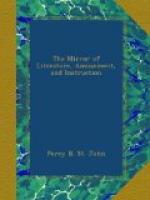replied the guest, blushing and looking downwards,
“that there was no harm in travelling slowly
and satisfying my curiosity, providing I could reach
your residence by this day; for such was my father’s
charge.” “You were to blame,”
replied the sage, “in lingering, considering
that the avenger of blood was pressing on your footsteps.
But you are come at last, and we will hope for the
best, though the conflict in which you are to be engaged
will be found more dreadful the longer it is postponed.
But first accept of such refreshments as nature requires
to satisfy, but not to pamper, the appetite.”
The old man led the way into a summer parlour, where
a frugal meal was placed on the table. As they
sat down to the board, they were joined by a young
lady about eighteen years of age, and so lovely, that
the sight of her carried off the feelings of the “young
stranger” from the peculiarity and mystery of
his own lot, and riveted his attention to every thing
she did or said. She spoke little, and it was
on the most serious subjects. She played on the
harpsichord at her father’s command, but it
was hymns with which she accompanied the instrument.
At length, on a sign from the sage, she left the room,
turning on the young stranger, as she departed, a
look of inexpressible anxiety and interest. The
old man then conducted the youth to his study, and
conversed with him upon the most important points
of religion, to satisfy himself that he could render
a reason for the faith that was in him. During
the examination, the youth, in spite of himself, felt
his mind occasionally wander, and his recollections
go in quest of the beautiful vision who had shared
their meal at noon. On such occasions, the astrologer
looked grave, and shook his head at this relaxation
of attention; yet, on the whole, he was pleased with
the youth’s replies. At sunset the young
man was made to take the bath; and, having done so,
he was directed to attire himself in a robe, somewhat
like that worn by Armenians, having his long hair
combed down on his shoulders, and his neck, hands,
and feet bare. In this guise he was conducted
into a remote chamber totally devoid of furniture,
excepting a lamp, a chair, and a table, on which lay
a Bible. “Here,” said the astrologer,
“I must leave you alone, to pass the most critical
period of your life. If you can, by recollection
of the great truths of which we have spoken, repel
the attacks which will be made on your courage and
your principles, you have nothing to apprehend.
But the trial will be severe and arduous.”
His features then assumed a pathetic solemnity, the
tears stood in his eyes, and his voice faltered with
emotion as he said, “Dear child, at whose coming
into the world I foresaw this fatal trial, may God
give thee grace to support it with firmness!”
The young man was left alone; and hardly did he find
himself so, when, like a swarm of demons, the recollection
of all his sins of omission and commission, rendered
even more terrible by the scrupulousness with which




